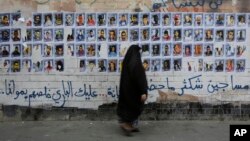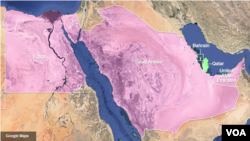Human rights activists say the Bahrain government is continuing to target political opponents by using terrorism allegations to strip them of their citizenship.
"The Bahraini government has been using revocation of nationality, rendering many of its citizens stateless in the process, as a tool to crush all forms of opposition, dissent and activism," Sima Watling, Amnesty International's Bahrain researcher, told VOA.
"Arbitrarily depriving citizens of their nationality, rendering them stateless, is a violation of international law," she added.
Last week, a Bahraini court revoked the citizenships of 11 people charged with terrorism, according to local media reports.
The government has been revoking the citizenship of its people for several years as part of a state policy to crack down on alleged terrorists.
In May, a Bahraini court revoked the citizenship of 115 people during a mass terrorism trial, the highest number to lose their nationality at one time in the country.
Bahrain's public prosecutors said at the time that the 115 people were part of the Zulfiqar Brigades who were arrested in 2016 on charges of terrorism including building bombs, receiving weapons training and plotting to kill police officers in Bahrain. They were also accused of having ties to Iran's Revolutionary Guard Corps (IRGC).
Hundreds of cases
Watling said that since 2012, at least 741 cases of revocation of nationality have been recorded by her organization, including at least 252 in 2018.
Brian Dooley, a senior adviser at Washington-based Human Rights First, says the government might be deterring crimes with the measure, but the main goal is to crack down on those who are exposing corruption in the government.
"It is fake to say it is a counterterrorism measure," Dooley said. "It really is a way to intimidate and silence people who are drawing attention to some of the embarrassment of the government over corruption and human right abuses."
Individual cases
Syed Ahmed Alwadaei, the director of advocacy for the London-based Bahrain Institute for Rights and Democracy, told VOA the Bahraini government revoked his citizenship in January 2015 over charges of disturbing the public security.
"I fled Bahrain after serving six months in prison, where I was subject to torture, and post my release I continued to suffer. I felt it was no longer safe to stay in Bahrain," Alwadaei said.
"Bahrain considers any criticism against the government or the exposure of the human rights situation as a threat to the state," he added.
Alwadaei has been granted asylum in Britain, where he now lives.
Jawad Fairooz, 57, a former Bahrain parliament member, also lives in London. He told VOA that authorities revoked his citizenship in 2012 when he was visiting his family in London.
"Up until now I don't know the reasons. Nobody [has given] me any reason why they revoked my citizenship," said Fairooz, chairman of London-based rights group Salam for Democracy and Human Rights.
"They [government] take away their pensions, they are not allowed to have health care, not allowed housing benefits, and their kids will be born stateless," he added.
The kingdom's ministry of foreign affairs did not respond to VOA's request for comment.
Terrorism laws
Since the Arab Spring, Bahrain has introduced laws that give courts sweeping powers to revoke the citizenship of anyone deemed a threat to the government.
"In July 2013, amendments were made to the 2006 anti-terrorism law giving courts powers to hand down rulings stripping defendants of their nationality when they are convicted with terrorism offenses," Watling said.
"On 24 July 2014, a new decree was issued amending the 1963 Citizenship Law, and was expanded to also include anyone whose acts contravene his duty of loyalty to the kingdom," she added.
Effective?
Analysts such as Christophe Paulussen, a senior researcher at the Hague-based Asser Institute, say stripping people of their citizenship is counterproductive.
"If that person has indeed been involved in crimes, then the victims are entitled to justice. However, if the country that had a jurisdictional link with that person disconnects that link, then you remove an important possibility to bring that person to justice," Paulussen said.
"Even if the former state is not endangered, that does not mean the security of other states is not jeopardized," Brian Dooley of Human Rights First said, agreeing with Paulussen's assessment.
"It is working in terms of intimidating people from criticizing the government. It is certainly not working in terms of preventing any terrorism," Dooley said.
Human rights
The majority of Bahrain's 1.4 million people is Shi'ite, but the Sunni Al Khalifa family has ruled the country since late 1700s.
The country's Shi'ite population has long complained about discrimination. Following the 2011 Arab Spring, they launched demonstrations and the kingdom promised reforms, but little has been done.
The United States has been critical of the kingdom's human rights record, but critics say the Trump administration's approval of a $3.8 billion weapons sale to Bahrain has emboldened the kingdom to disregard human rights concerns.
Iran's proxies
Iran is accused of instigating the Shi'ite majority against the government and in July, the U.S. State Department designated al-Ashtar Brigades, a Bahraini Shi'ite militant organization with ties to Iran's Islamic Revolutionary Guard Corps, as a specially designated global terrorist organization.
"Today's designation serves notice that the United States sees plainly what Iran is trying to do to Bahrain through its proxy, the terrorist group al-Ashtar," the department's counterterrorism coordinator Nathan A. Sales said in a statement at the time.





